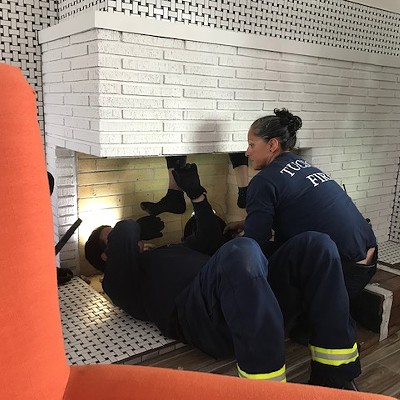But that peace was shattered on Aug. 7, when The Broom Closet was violently targeted by hateful half-wits. Sometime in the wee morning hours, they heaved heavy steel balls through the glass front door and completely trashed the front window.
Kesler learned of the vandalism a short time later. She guarded her business that night, peering nervously through broken glass shards that shimmered in the eerie glow of streetlights.
"It was a very traumatic experience," she says.
In fact, there's been a string of strange incidents plaguing The Broom Closet since it opened in April, petty but disturbing events: a customer's car ransacked; gang signs etched into the front window.
Adding insult, after the window was later destroyed, The Broom Closet put out a collection plate for replacement costs. Two teenaged girls popped in and stole it.
In all, it's an unfortunate pattern for this cheery little shop, nestled in the heart of Tucson and dear to the hearts of local pagans. Repairs cost up to $600, but the landlord is allowing Kesler pay in installments. And the shop's financial backer, a Christian minister, has promised to help.
But the destruction's scars go far beyond money, Kesler says. "This is the only place for Wiccans and other pagans to gather in Tucson, a very special place, and now, that's been violated."
More troublesome, The Broom Closet was the only store targeted in this nondescript strip mall near Grant Road and Stone Avenue, and Kesler has no doubt it was sheer, mean-spirited vandalism.
"They broke the window only inches from display shelves, where I had expensive things like hand-etched tarot card boxes," she says. Nearby, the cash register was wide-open, "and it wasn't touched."
The police have called this a case of criminal damage. But to Kesler, it's a hate crime. "Why else would someone cause that much damage?" she says, adding that her customers "are outraged."
That outrage has fired-up a normally low-key community. Like gay Americans, witches and other pagans often keep their beliefs private for fear of losing their jobs or being attacked by Christian right-wingers. In other words, they exist in the "broom closet."
Many pagan beliefs center around a religious reverence for nature, and date back to the ancients Druids. But thanks in part to Hollywood stereotyping, practitioners have long been lumped with devil worshippers.
"If the public were better informed, we could live in peace," Kesler says. "But people believe that the practice of Wicca and paganism is devil worship. How could it be? Our religion even predates Christianity, and the whole Christian concept of a devil."
This is hardly the first time that Wiccans and pagans have faced harassment. In Iraq, Wiccan members of the military were recently pelted with rocks and bottles by fellow soldiers as they worshipped in a sacred circle. To preclude further incidents, military officials called in chaplain and Wicca expert Patrick McCollum. And immediately, the chaplain set about dispelling misconceptions about paganism.
Speaking to a reporter from the Contra Costa Times, McCollum noted that too many people get their ideas of paganism from television shows such as Buffy the Vampire Slayer or Charmed. And that translates into plenty of ignorance.
"Education is the single most powerful tool," in dealing with misunderstandings in the armed forces, he said.
And Darla Kaye Wynne, a pagan in Great Falls, S.C., recently garnered the scorn of townspeople when she asked that the City Council not mention Jesus Christ in opening prayers. During a public hearing on the matter, scores of townspeople turned out to oppose her, amidst cries of "Hallelujah!"
Wynne stuck to her guns. With backing from the American Civil Liberties Union, she sued--and won--in federal court. For her trouble, Wynne's home has been vandalized nine times; someone killed and gutted her cat, then hanged it; her truck's gas tank has been filled with sand; and she's been largely ostracized by the good Christians of Great Falls.
Such conflicts will likely become more common; researchers believe that the number of neo-pagans in the United States continues to grow, and may already number up to 250,000. Of those, the majority live in California and New England, while an estimated 8 percent dwell in Arizona and other mountain states.
And as a group, pagans tend to hold refreshingly progressive values. In her 1998 book, A Community of Witches: Contemporary NeoPaganism and Witchcraft in the United States, sociologist Helen Berger notes that pagans emphasize visions of a just world, a clean environment, women's rights, lesbian rights and gay rights. They also share a distinct dislike for authoritarianism.
While this might place them at odds with currently dominant political trends, pagans aren't particularly singled out by fundamentalist Christians, says longtime local Wiccan Jim Laws.
"The 'fundies' don't seem to be going after us a lot. In the '80s and '90s--when there was still this idea of the international satanic conspiracy burning babies and all that kind of stuff--there was more trouble." But the Christian Right backed off, he says, when the ridiculous baby-burning charges vaporized. "The FBI did an investigation, and found that you cannot completely eliminate bones by burning them in a campfire. Fires don't burn that hot. Anyway, there just wasn't any evidence of such a satanic conspiracy, and as far as I know, the fundies just gave that up."
Today, there are pagans in all walks of life, Law says, including Wiccans stationed at the Davis-Monthan Air Force Base.
"There are even conservative Wiccans," he adds. "I don't understand it, but there are."
Back at The Broom Closet, Katherine Kesler and her customers are just trying to understand why this low-key business was targeted. Stephanie Fossman, a store regular, put her thoughts to paper on Aug. 7. The result is a furious, two-page note that Kesler keeps on the counter. It's been signed by a small army of angry, fellow pagans.
"This morning," Fossman writes, "one would see the injustice and religious discrimination that, apparently, continues to thrive in our community. ... As the customers who trickled in to shop saw the scene in this place, they each picked up a broom or a shovel and began to try and piece the storefront back together. ...
"Religious freedom is something that is promised to every single American," Fossman writes. "Today, that freedom was shaken to the core."












